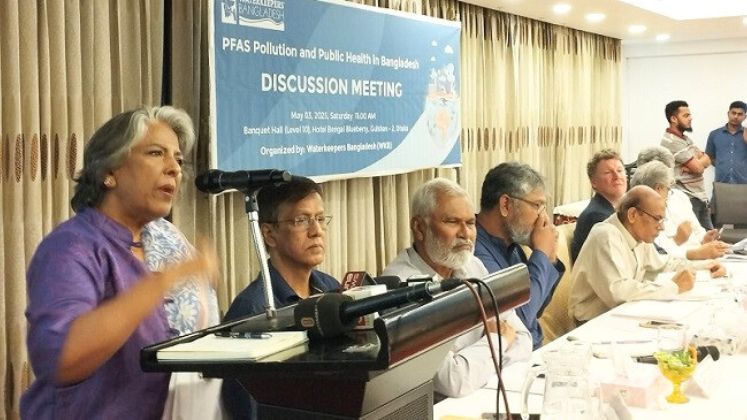
A seminar aimed at raising awareness about the alarming levels of per-polyfluoroalkyl substances (PFAS) pollution in water and soil was held on Saturday, 3rd April, organised by Waterkeepers Bangladesh. The event, titled PFAS Pollution and Public Health in Bangladesh, highlighted the growing health and environmental risks posed by industrial waste containing PFAS chemicals.
Speakers at the seminar revealed that Bangladesh’s leather and textile industries extensively use PFAS chemicals, which are highly toxic to humans. Waste from these factories has contaminated local soil and water sources, leading to increased health issues such as cancer, liver damage, and thyroid problems among residents living near industrial zones.
The seminar pointed out that PFAS, commonly found in non-stick cookware, food packaging, firefighting foam, and fabrics, has been detected in 87 per cent of surface water samples and 75 per cent of tap water around textile factories across the country. Notably, the PFAS concentration in the Karnatoli River in Savar was reported to be 54,000 times higher than the safe limit set by Dutch authorities, severely weakening the immunity of local populations.
Despite these grave concerns, Bangladesh has yet to implement international bans on PFAS or establish national regulations to control its use and disposal. As a result, the widespread contamination continues unchecked.
Addressing the audience, Adviser to the Ministry of Social Welfare Sharmeen S. Murshid expressed deep concern over the crisis. She emphasised the government’s responsibility to safeguard surface water but lamented the lack of effective policies and vision to tackle the issue.
European Union Program Manager Hubert Bom highlighted that rapid industrialisation is a key driver of PFAS pollution.
The seminar was chaired by Dr. Mujibur Rahman Howlader, former Chairman of the National River Protection Commission, with Waterkeepers Bangladesh Coordinator Sharif Jamil moderating the session. Senior development activist Shahid Hasan presented a position paper detailing the extent of PFAS contamination in Bangladesh.
The event underscored the urgent need for comprehensive policy measures and stricter enforcement to prevent further environmental damage and protect public health from the toxic effects of PFAS pollution.






